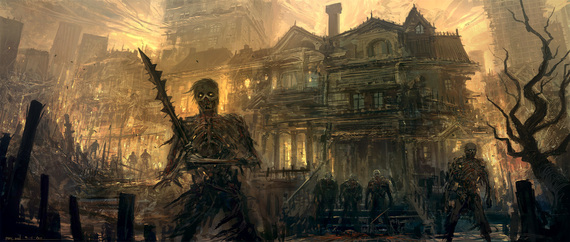For more than a century now, depth psychology -- the research and practice built on the work of Pierre Janet, William James, Sigmund Freud, Anna Freud, Lou Andreas-Salome, C.G. Jung, and other explorers of the unconscious -- has invited us to interpret "outer" events much like we'd interpret dreams: by finding their symbolic import.
What, then, might be underneath the recent public fascination with a zombie apocalypse?
This new myth has ancient roots. Many cultures tell tales of dangerous beings not alive and yet not quite dead. For example, ancient Jewish stories describe the Golem, an automaton created to carry out commands with literal-minded consistency. Some of the powerful rabbis who programmed them had trouble shutting them down again.
More recently, the zombie resurfaced in Bram Stoker's novel Dracula, in Mary Shelley's Frankenstein, and in the 1968 film Night of the Living Dead.
To some extent, the recurring rise of the zombie reflects our fear of the shadow side of unreflective technological progress. As one Manhattan Project bomb scientist put it, "The tools get hold of you." When we invent, our darkest impulses also participate. "You seek for knowledge and wisdom," warns Dr. Frankenstein, "as I once did; and I ardently hope that the gratification of your wishes may not be a serpent to sting you, as mine has been."
The very energy spent to repress the darkness-within instead of owning it amplifies and spreads it. The genetic strain, nanotech or virus that escapes from the lab escaped first through an open door in the unreflective mind bent on disembodied, mentalistic ambition. Frankenstein again:
If the study to which you apply yourself has a tendency to weaken your affections and to destroy your taste for those simple pleasures in which no alloy can possibly mix, then that study is certainly unlawful, that is to say, not befitting the human mind. If this rule were always observed; if no man allowed any pursuit whatsoever to interfere with the tranquillity of his domestic affections, Greece had not been enslaved, Caesar would have spared his country, America would have been discovered more gradually, and the empires of Mexico and Peru had not been destroyed.
In my graduate classes on psychology and myth I refer to this rush to invent and conquer as Promethean enthusiasm. Others have called it the Faustian Bargain. What price progress?
The lack of self-inquiry so evident in unregulated technologizing reflects a deeper cultural problem. We can access it by asking: What really needs inventing? What needs reinventing?
Every large and influential institution -- a government, religion, university, movement, economy, etc. -- is a complex system that survives through adaptation. When faced with accumulated change in the social conditions around it, the institution must do one of three things. It can reinvent itself by reimagining and perhaps modifying its core mission and values and the plans and practices they generate (transrevolution). It can blind itself to the need for adaptation and collapse (self-destruction). Or it can simultaneously resist adaptation while increasing its hold on people convinced of their dependency on it (parasitism).
In other words, an institution confronted by the need to change can create new contributions, lethal absurdities -- or walking zombies in search of nourishing blood. As Nietzsche observed long ago, no institution can survive if only hypocrites staff it.
Such an institution is not really alive anymore, but not defunct either. Bram Stoker referred to the race of vampires as "the undead." Exposure to sunlight hurts their eyes. They hide during the day and feed at night.
It makes psychological and folkloric sense, then, that around 2008, when the bubble burst like a boil under the world economy, news stories described "zombie banks" full of "toxic assets." Hungry were these zombies indeed for fresh infusions from the public's fiscal blood bank.
Banking systems fed by unregulated casino capitalism and corporate welfare, religious institutes mired in sexism and scandal, governmental bureaucracies that perpetuate themselves while fighting reform, fossil fuel conglomerates whose products burn rivers and overheat the atmosphere, one-size-fits-all "education" that stamps out uniqueness and creativity, hysterical mass media that drum up their own "news": these are the zombies of our day. Perched in the soulless gray zone between life and death, they shamble forward consuming every source of energy they can sink their bloody teeth into. Collectively, their hunger has brought us all to the verge of ecological apocalypse.
Jung would have said that only self-knowledge patiently gathered in a relational context -- the wisdom between us as well as within us -- could counter such destructiveness. He was partly right, but only partly, favoring as he did the introvert's emphasis on inner over outer. Stoker's solution had the virtue of being more extraverted and direct: driving a wooden stake through the vampire's undead heart.
We are the true stakeholders in the health of how we live and work. Questioning our dependency on what zombie institutes provide could take a first step toward breaking free of their clinging grasp while donating our precious vitality to endeavors that beautify and enhance life on Earth instead of converting it into a fume-darkened Underworld.
Sign up for Peacock to stream NBCU shows.
to stream NBCU shows.

